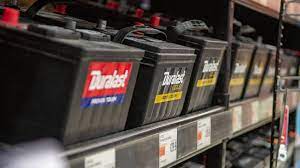Though a car battery can last for up to 18 years, it’s only able to stay in storage that long if it maintains an average charge of 75 percent or more. This is because the self-discharge rate increases as the battery ages, and if the self-discharge rate is higher than the charging rate, you’re at risk of ending up with damaged plates.
If you’d like to store your car battery for a significant amount of time—like when you’re parking your vehicle for winter—make sure it’s fully charged, and then don’t let it drop below 75 percent.
Now that you know how long car batteries can last on a shelf, here’s some advice about how to maintain them during regular use.
A new car battery should be charged before it is put in a car, and the charge should be maintained.
When a battery is manufactured, it is charged and tested for performance. It then goes through long trips in trucks and warehouses before arriving at the store where you purchased it. The whole time, it is draining its power because of the internal chemical reaction that occurs as it just sits there. The battery may be fully charged when you buy it, but its charge will drain over time if you put the battery on the shelf and don’t drive your car frequently enough to recharge the battery.
Batteries should be charged before they are installed in a car, and their charge should be maintained when they are installed. This means driving your car regularly or using a device called a battery tender to keep your battery fully charged when it’s not being used (for example, if your vehicle only sees occasional use). If this isn’t feasible and you’re not able to drive your car every week or two, start up the engine once in awhile just to give the alternator a chance to recharge the battery—15-20 minutes every other week should suffice.
A fully charged battery will not freeze in cold weather.
Sometimes, you may be given a new or used car battery on the shelf. If you leave it like this and don’t charge it before use, you will have a problem in cold weather. A fully charged battery won’t freeze because the water in the electrolyte is diluted by the sulfuric acid. However, if a car battery is left unused for too long and discharges, then when it gets cold it can freeze and crack its casing. Once this happens, that battery must be discarded.
Besides damage from freezing temperatures, there are other problems to consider when storing your car’s battery for extended periods of time. Having lead acid batteries sit dormant for too long can cause corrosion on the terminals and reduce their ability to hold an electrical charge, so check your spare battery regularly to see if the terminals look old or rusty. The best way to avoid all of these problems is to make sure you know exactly how long your spare battery has been sitting before using it (or giving it away).
Batteries that are exposed to heat or vibration may not last as long.
If you need to store a car battery for an extended period of time, it’s best to keep it in a cool place away from direct sunlight. Heat and vibration can damage the plates inside the battery, which will shorten its lifespan or even render it useless.
While storing your car battery in a cool location should help prevent any damage, some batteries are more prone to shelf life loss than others. If you’re unsure how long your specific battery will last on the shelf, carefully read the instruction manual that came with it if possible.
Use of a good battery charger will help prolong the life of your car battery.
To prolong the life of your car battery, you should use a good battery charger and keep the battery fully charged. Keeping the battery charged will slow down the self discharge rate and cut down on corrosion. When purchasing a new car battery, it should be recharged before use.
Storing your car battery in a cool, dry place will also help prolong its life. Never store your car in an area where temperatures could exceed 120 degrees Fahrenheit (49 degrees Celsius), as this can cause permanent damage to the lead plates inside the cell and significantly reduce its service life.
Monitoring the charge and recharging as needed will also ensure that you get as much life out of your car’s batteries as possible.
Maintaining charge on your spare car battery is important to ensure it works when you need it.
Maintaining charge on your spare car battery is important to ensure it works when you need it. A good battery charger will keep the battery charged and ready for use, or a smart charger will allow you to keep it in storage for long periods of time without damaging the unit.


